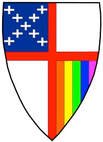|
O God, you are my God; eagerly I seek you; *
This week our lessons all ring with the theme of “returning.” Moses turns to the Burning Bush to find holy ground, sacred space in the presence of God. Paul assures the Corinthians that God is faithful. And Jesus asks us to repent: to turn and change our minds and hearts. There is a mutual nurturing of the eternal relationship expressed in this turning and returning to one another. I was also struck by the contrast between our imagery this morning: …A blazing bush alive with the Spirit of God contrasted with the story of a withering fig tree in the Gospel. They seem to be two different but common ways in which we encounter God. The Burning Bush is a like a great event. We feel we are present to a miracle or epiphany; a suddenness that makes us awake to the majesty and mystery of life. Something that turns our heads and hearts and fills us with wonder and the desire to seek God further. Then there is also the unexpected painful blaze: war, an accident, a death, we hit bottom, a betrayal - and pain explodes in our hearts and we find ourselves burning for understanding - and seeking God in the blaze. In both circumstances we recognize the sacred space in the presence of something much bigger and more powerful than us. Love comes crashing out of us - or upon us in the expression of so many other emotions: excitement, joy, awe, anger, fear. It is alive and it is big and hard to turn away from. We step closer like Moses. At other times in great contrast we find ourselves and our experience with God much like the fig tree: feeling drained and exhausted, withering. We feel like we are just going through the motions. We are just trying to do the next thing, but we don’t feel enlivened. We don’t feel like we are living our true selves or that we are affirmed. We are not fed and we know we are not blossoming. Or the fruit of the Spirit that is within us. How do we step closer to the presence of God when we are in this state? How can we recognize that we still are on the threshold of sacred ground? Jesus tells the story of the fig tree to help us understand just that. There is time basically… In Jesus’s parable, The owner of the land says that the fig tree is a waste of soil, cut it down. But the gardener says: 'Sir, let it alone for one more year, until I dig around it and put manure on it." There is hope and there is activity to help us find ways to nurture the spirit…A slow, enduring nurturing… The soil of our souls needs to be turned and fed and mulched so we can grow and develop those fruits of the Spirit. We can’t always see the full picture. Sometimes it is this slow nurturing, feeding of the soil that Jesus describes and the endurance that Paul describes to the Corinthians. As my husband says “time takes time.” Where is the blaze and fanfare? Well...not all sacred moments are cinematic. How do we move closer into the sacred presence of God? Sometimes taking the step closer involves trusting ourselves. Trust that God is available in the everyday if I seek that relationship. We all know what it is like to be alone and awake at 3 am worrying. I have found 3 am is a great time to practice trusting, breathing, to pray, or even enter into dialogue with God rather than to fret and toss and turn. And the psalmist today reminds us: …my mouth praises you with joyful lips, When I remember you upon my bed, * and meditate on you in the night watches. For you have been my helper, * and under the shadow of your wings I will rejoice. My soul clings to you; * your right hand holds me fast. Apparently we’ve known this for thousands of years: Time takes time - and 3 am is always a good time to begin… Sacred Presence and the Holy Ground is always with us, as Paul is writing to the Corinthians, “God is faithful.” But Paul’s message also includes some things that may strike our ears as difficult: He says, “No testing has overtaken you that is not common to everyone. God is faithful, and he will not let you be tested beyond your strength, but with the testing he will also provide the way out so that you may be able to endure it.” Some of us are enduring especially painful things. But if we read it within the context of the community, we can trust that we will be able to endure through the support and nurturing of one another. This is almost always Paul’s stance. He is constantly preaching to the early church through teachings that strengthen their bonds: Teaching them to strengthen one another, tend, feed and nurture one another. As individuals and as communities some trials come on us that we have absolutely no control over. At other times we have been given signs and warnings, but there are no immediate consequences like Paul makes it out to sound. We have habits of nature or heart or circumstance that compile over time and then we find ourselves injured by that accumulation. Both Paul and Jesus are speaking to communities during a time of great trial and an accumulation of fear. In the Gospel some Gentiles are being killed by Pilate. Some present tell Jesus of these occurrences. And from the way it is described we can assume that they told the story with some lack of empathy, because Jesus responds powerfully; asking them basically, “Do you think they were more sinful than you because these atrocities have occurred?!”… Is that some kind of proof of their guilt - or reason for their pain? He then goes on to assure us that the suffering are not more deserving of pain than others who have been spared. He essentially asks the community to renew a right spirit, to repent meaning: to turn and change. He also says something that sounds difficult. “No, I tell you; but unless you repent, you will all perish as they did.” He is asking the community to turn to find that sacred presence in their lives, not so that they will be spared suffering or death. He is saying those deaths were cruel and meaningless. Their suffering was cruel and meaningless. Jesus asks us to repent: change our minds and our hearts because he wants us to have meaning in our lives. Turning toward the sacred presence offers our lives meaning in the midst of the way things are rather than simply reasons for why things are the way they are. Whether we are startled and awakened by something too big to handle alone, whether it is a blaze of wonder - or the fire of pain, or when we feel stunted, or even when we just seem to be sleep walking…In the Community of Christ we find ourselves in solidarity with one another and part of a relationship that is nurturing… A community in which everyone is growing in affirmation of each individual’s unique gifts. And a community that is seeking deep connection with the source of life we name God: The source of life we name Love. O God, you are my God; eagerly I seek you; *
0 Comments
Leave a Reply. |
AuthorThe Rev. Heather K. Sisk Archives
July 2024
Categories |
We Would Love to Have You Visit Soon!
WE ARE ALL MADE IN THE IMAGE OF GOD |
Telephone845-635-2854
|
|
 RSS Feed
RSS Feed

